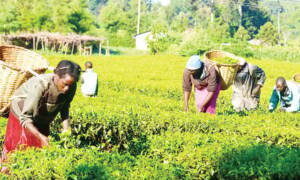A good idea gone wrong? Why crashing food prices will hurt Nigeria’s farmers, food System

By Chi Tola Roberts
In October, I travelled to Northern Nigeria and spent two months visiting farms, cooperatives, and agricultural communities. What I saw and heard left me deeply concerned.
Farmers are saddened, discouraged, and in some cases, angry. They feel abandoned — and rightly so.
The Federal Government’s recent directive to slash the prices of farm produce may appear noble at first glance. It seems like a relief strategy to make food more affordable for struggling households amid rising inflation. But when you look closely, the decision is not only unsustainable — it is dangerous for the future of Nigerian agriculture.
Without government-owned farms or effective buffer systems to absorb the losses that follow such a policy, the entire burden falls squarely on the shoulders of private farmers. And that burden may be too heavy for many to bear.
Disincentivising future production
Farmers across the North told me the same story: high input costs, high transportation costs, and yet, the government expects them to sell at reduced prices. How?
The cost of fertiliser, agrochemicals, labour, and logistics remains high, and yet farm-gate prices are being forced downward. For many, profit margins have vanished completely. If a farmer cannot break even this season, what motivation will they have to return to the field next year?
Instead of encouraging production, this price slash risks achieving the exact opposite — discouraging the very people we depend on for food. No one kills a tree by cutting its branches, but that is exactly what this policy has done — attacked the farmer rather than the root problem.
Rising loan defaults and farmer bankruptcies
Let’s not forget that most small-scale farmers finance their operations through cooperative or business loans. They plan their repayment schedules based on projected yields and market prices. A sudden crash in farm-gate prices destroys that balance overnight.
Many farmers I spoke with in the North said they are already unable to pay back the loans they took for this farming season. For some, this will mean losing their land, their equipment, and their livelihoods. For others, it means permanent exit from farming.
When loan defaults increase, cooperatives weaken, credit dries up, and the ripple effects spread through the entire agricultural ecosystem.
No government cushion, no safety net
The truth is simple: the Federal Government and most State Governments do not operate farms. They have no production base of their own to absorb the shock of this price slash.
So, when prices are forced down, who takes the loss? The farmers. When margins vanish, who bleeds financially? The farmers. When they can’t go back to the farm next season, who will suffer food shortages next year? The entire nation.
This is why the directive feels like a short-term fix with long-term pain. There is no safety net. No buy-back programme. No buffer stock. No insurance cover.
Unaddressed input costs
The government’s approach is treating a symptom, not the disease. The real issue has always been the cost of farm inputs, not the cost of farm produce.
If fertilisers, seeds, chemicals, and mechanisation tools were affordable, food prices would naturally adjust downward. Farmers would sell cheaper price because their cost of production would be lower.
Instead of slashing produce prices, government policy should have focused on cutting input costs — that’s where true sustainability lies. Without that, this price slash becomes an artificial control that hurts producers and eventually leads to scarcity.
Distorted market signals
Agriculture thrives on predictability. Farmers plan their planting seasons based on expected market trends. But when policy uncertainty becomes the norm — one day liberalisation, the next day price control — it destroys confidence.
Investors withdraw. Young people lose interest. Farmers scale back. That’s how a country slips from food sufficiency into dependence on imports. And once that happens, we will find ourselves paying far higher prices for imported food than we ever paid for local produce.
The hidden cost — Food insecurity ahead
Crashing food prices without reducing production costs is like cutting a ladder while still climbing it.
Yes, food may seem cheaper for now, but what happens when farmers decide not to plant next year? What happens when local production collapses and we begin to import again at dollar-pegged rates? What happens when our cooperatives fail and rural jobs vanish?
We are staring at a potential food crisis — not because farmers are lazy, but because policies have made farming unprofitable.
The way forward:
The government’s goal of reducing food prices is valid — Nigerians need affordable food. But the method must change.
Here’s what should have been done instead: slash the price of inputs, not production; make fertiliser, seed, and equipment affordable; Support farmers through guaranteed off-take agreements to ensure they sell at fair prices; invest in processing and storage infrastructure to reduce post-harvest losses; encourage mechanisation and irrigation support to improve productivity.
Establish buffer stock programmes where the government buys excess produce at market price; engage directly with farmer cooperatives to design fair and sustainable policies, and these are not abstract ideas; they are practical solutions that empower farmers rather than punish them.
Conclusion
From my two-month visit across Northern farms, one thing became clear — farmers feel unseen and unheard. Their hands feed the nation, but their voices are drowned by political noise.
Crashing food prices without cushioning farmers is not a victory — it is a slow bleed of our food system. If the goal is to make food affordable, let’s start where it matters — at the roots, not at the fruit.
Let’s make inputs cheaper, empower farmers, and create real pathways to productivity. Otherwise, this year’s “cheap food” may become next year’s hunger.
Rite Foods marks Compliance Week 2025, drive home shared responsibility
From Left: Lekan Oladipupo, HSE officer, Mr. Godfrey Ojo, Head Internal Audit, Adeyemi Ade…





